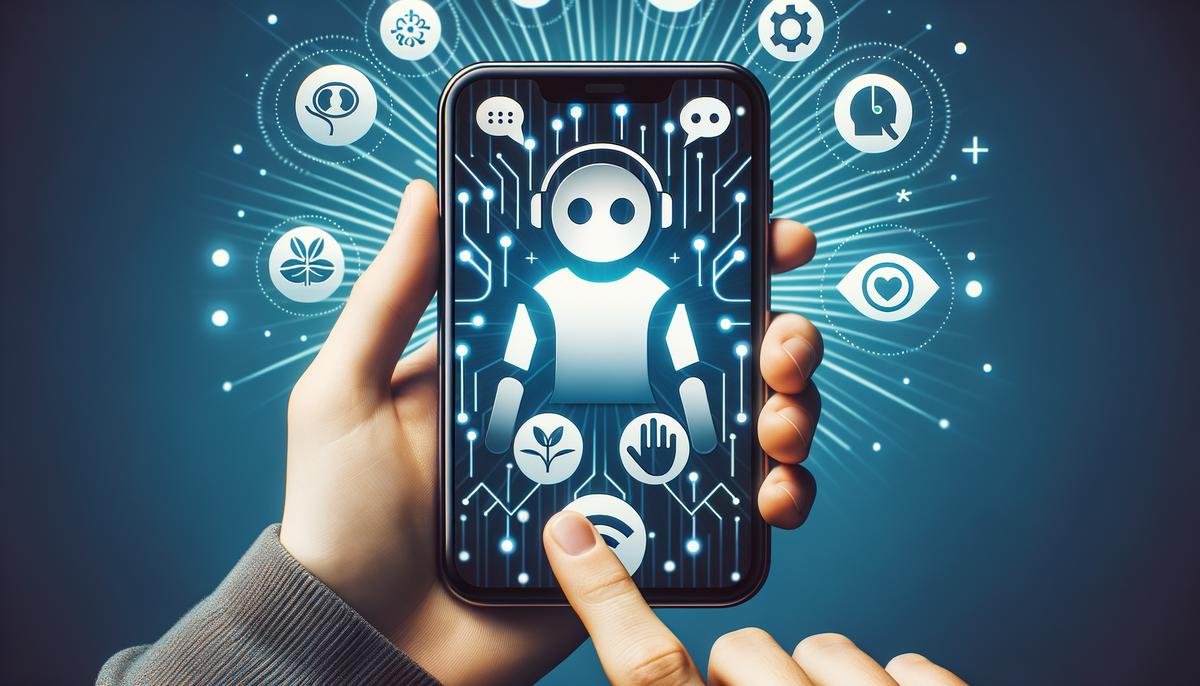The integration of AI-driven therapy solutions like Woebot into mental health care represents a significant development. This integration presents an opportunity to examine how these innovations are changing our approach to mental wellness. As we explore this technological advancement, we can see the potential it holds for providing support, the challenges it faces in replicating human empathy, and the ethical considerations it raises.
Woebot Origins
Dr. Allison Darcy, a clinical psychologist from Stanford University, developed Woebot by combining psychology with artificial intelligence. Darcy's goal was to make therapy more accessible and affordable.1 Woebot provides conversational therapy based on established psychological approaches:
- Cognitive Behavioral Therapy (CBT)
- Interpersonal Psychotherapy (IPT)
- Dialectical Behavioral Therapy (DBT)
CBT, the foundation of Woebot's approach, helps users identify and change negative thought patterns. Through daily check-ins, Woebot uses CBT techniques to guide users in recognizing distorted thinking and encourages them to view situations from a different perspective. IPT aspects focus on interpersonal issues, helping users navigate social roles and relationships, while DBT provides skills for emotional regulation and stress tolerance.
Woebot is based on solid scientific evidence. Dr. Darcy ensured that every interaction with Woebot was a meaningful therapeutic exchange supported by research. Each therapeutic conversation with Woebot is scripted and reviewed by experts, with algorithms learning from each interaction to personalize subsequent conversations.
Woebot stands out from other mental health apps by providing an accessible platform, designed from the ground up, with therapeutic integrity and user safety in mind. It balances AI efficiency with human empathy, creating a safe space for users to express themselves openly. The relationship nurtured between user and Woebot represents a vision for the future where support is immediate, effective, and widely accessible.

AI in Mental Health
AI in Mental Health Therapy: A Comprehensive Review
The integration of artificial intelligence (AI) in mental health care is a significant technological advancement. The development of AI-driven applications like Woebot has introduced new therapeutic possibilities, changing traditional psychotherapy. At the core of this transformation is a goal to use AI's potential to improve the effectiveness and reach of therapeutic interventions. However, as we explore this new path, it is important to consider both the potential benefits and drawbacks of integrating AI into mental health practices.
The Benefits of AI in Therapy
Access and Availability: AI-driven mental health platforms such as Woebot help reduce geographical and financial barriers to therapy. Unlike human therapists limited by time and location, AI applications offer support around the clock, making them valuable for individuals in remote or underserved areas.
Consistency and Personalization: AI in therapy maintains consistency and attentiveness. It does not tire, show bias, and adheres strictly to its programming—making therapy free from human error or bias. AI applications use machine learning algorithms to adapt therapeutic techniques to the user's unique psychological needs, creating a personalized therapeutic experience.
Anonymity and Comfort: For many, the stigma surrounding mental health is a barrier to seeking help. AI platforms provide anonymity, encouraging individuals to open up without fear of judgment. This aspect of AI therapy often serves as a stepping stone for those who may later seek human counseling.
The Challenges of AI in Therapy
The Lack of Empathy: Despite advancements, AI lacks genuine human empathy. While AI can simulate understanding and care, the absence of emotional connection can leave users feeling isolated in moments of vulnerability.
Understanding Nuances: The subtleties and complexities of human psychology can sometimes be missed by AI's algorithms. Misinterpretations or generic responses in sensitive contexts can inadvertently worsen users' conditions, highlighting the need for ongoing oversight by mental health professionals.
Data Privacy and Security: Trusting our innermost fears and pains to an AI assistant has risks. Breaches in data security can expose confidential information and erode trust. Rigorous safeguards and ethical guidelines must support these digital confidants to protect users.
Indiscriminate Use: The one-size-fits-all approach could oversimplify complexities experienced by users. Distinguishing between those who might benefit from supplementing traditional therapy with apps like Woebot and those requiring more specialized human intervention is important.
The Path Forward
As we navigate the future intersection of AI and mental health care, balancing the use of technology while maintaining our human essence becomes critical. Collaboration between technological innovators and mental health experts is essential in refining AI applications to support rather than replace the human touch in therapy.
The emergence of AI in mental health therapy presents both opportunities and challenges. As technology leads us into new areas of therapeutic intervention, the combined knowledge of both humans and machines will shape a promising future in mental health care. Through the integration of human intuition and artificial intelligence, we strive to unlock new possibilities for psychological well-being.

Woebot’s Methodology
How Woebot's Conversational AI Works: Exploring the Mechanics
Examining the mechanics of Woebot's AI communication provides insight into the inner workings of a sophisticated system designed to provide mental health support through conversation. Woebot is more than a traditional chatbot; it's a digital tool equipped with a tailored understanding to deliver therapeutic interactions. This exploration dissects both the intelligence and safeguards embedded in Woebot's conversational AI, highlighting the differences with the more unpredictable nature of generative AI models.
Woebot's Core: The Rules-Based Approach
Woebot operates on a rules-based framework. Each path through this conversational structure has been carefully designed by a team of clinical psychologists, conversation designers, and AI ethicists. This team creates dialogue sequences that align with evidence-based therapeutic principles, ensuring Woebot remains both safe and effective.2 Utilizing Cognitive Behavioral Therapy (CBT), Woebot prompts individuals to express their emotional state, guiding them through strategies to challenge negative thoughts or perceptions.
Machine learning algorithms fine-tune the process, allowing for a personalized experience that feels uniquely attentive, yet always within the safe boundaries of established therapy practices.
Diverging from Generative Models
Woebot's structured, rules-based approach differs from the exploratory, unpredictable nature of generative AI models. Generative AI, like ChatGPT, relies on spontaneity—they generate responses in real-time, drawing from a vast pool of internet data. While impressive for drafting essays or creating art, when applied to mental health, they venture into uncertain territory.
Activating "empathy" in generative AI might reveal creativity, but also potentially unexpected outputs, questionable advice, or an unsettling level of apparent empathy that imitates human understanding without truly grasping the complexities of humanity. Such models risk pursuing the appearance of empathy without capturing its true essence.
Safety Nets and Reliability
Woebot uses the rules-based structure to customize therapeutic discourse and as a safeguard against the uncertainties of external inputs. Each response is a carefully considered move in the overall goal of promoting mental well-being, shielding the user experience from error-prone improvisation and maintaining an environment of trust and reliability.
Woebot is skilled at identifying moments when human therapeutic intervention is necessary, directing users towards professional support channels. Thus, the AI becomes not a substitute for human therapists but a bridge—a supportive companion guiding one towards the care they may need.
The Path Less Generated
Woebot's approach to conversational AI in mental health showcases a path that is less generated and more thoughtfully designed. By choosing a rules-based approach grounded in scientific evidence, Woebot realizes a vision where technology empowers rather than misleads, where support is based on the reliability of evidence-based care.
In the field of mental wellness, where every word can carry significant weight, Woebot's calculated precision offers safety and sensibility—a guide in the vast and sometimes turbulent digital landscape.
Woebot's conversational AI mechanics highlight the balance between human warmth and technological innovation—a balance carefully maintained within Woebot's virtual boundaries. This resilience against the challenges and opportunities of AI in sensitive applications like mental health signals a shift in how we might approach our collective journey towards well-being in the digital age.

Ethical Considerations
As the boundary between technology and mental health blurs with the adoption of AI in therapy, we face significant opportunities and ethical challenges. AI-driven therapies like Woebot bring increased access and convenience, but also raise concerns about privacy, data security, and the potential for unintended consequences.
The Private Saga of Confidentiality
In therapy, confidentiality is paramount, underpinning the therapeutic alliance. When AI enters this space, it brings privacy concerns. Shared information and emotions become data, requiring safeguards against breaches and respectful handling that reflects the importance of its origin.
Woebot Health carefully navigates this landscape, using encryption and strict adherence to privacy laws to protect user data. They strive to ensure that every piece of shared information is treated with respect, making data protection a key commitment.
The Shadow of Potential Harm
While AI can guide the path to self-understanding and wellness, it also has the potential to misinterpret, advise incorrectly, or provide responses that feel unnatural. The risk of harm exists, not from malice, but from the inherent limitations of artificial intelligence interpreting human emotions.
Woebot Health addresses this challenge by grounding their AI in evidence-based practices and embedding safeguards and clinician oversight. They acknowledge the boundaries of AI's understanding and position Woebot as a guide, not a replacement for human judgment.
The Ethical Compass in Data Security
In the era of data as both asset and liability, custodians of mental health data face significant ethical considerations. Breaches betray trust and can have serious consequences, emphasizing the responsibility of AI developers in this field.
Woebot Health adopts a strong mentality, with defensive measures bolstered by adherence to HIPAA, GDPR, and other regulations. Their commitment to data security is both an ethical obligation and a core element of their service, aiming to create a safe space for users to explore their mental health.
The Stoic Guardian: Woebot Health's Ethical Stance
Woebot Health stands as both pioneer and guardian of ethical norms in the integration of AI into mental health. They recognize that advancing mental health care through technology does not absolve them of important ethical responsibilities. Their approach, combining scientific rigor, personalization, and a commitment to user welfare, sets a high standard in the digital therapeutic landscape.
They navigate the promise of AI in mental health while remaining aware of the ethical challenges. By embodying the dual role of innovator and ethical steward, Woebot Health illuminates the possibility of a future where AI supports mental well-being within a framework of trust, privacy, and ethical integrity.
Woebot Health articulates a vision for the future that blends technological advancement with ethical imperatives, serving as an example for those seeking to integrate AI with the important aspects of mental health care.

Future of AI Therapy
The Horizon of AI-Driven Therapy: A Glimpse into Tomorrow
As AI-driven therapy solutions evolve, new opportunities arise with promises of technological advancements, regulatory changes, and an expanded definition of mental health care. The future trajectory of entities like Woebot reveals an exciting journey where technology and human understanding combine to support mental well-being.
The Technological Vanguard: Tomorrow's AI Innovations
Imagine a world where Woebot's conversational capabilities rival those of human therapists, aided by advancements in natural language understanding. Future iterations could harness virtual reality, creating immersive digital environments for therapeutic activities.
These innovations would enhance engagement and personalization. Machine learning algorithms could discern patterns in user interactions, enabling real-time adaptation to emotional and cognitive states.1 Integration of biomarker technology could provide a holistic view of mental well-being, tailoring recommendations accordingly.
Regulatory Renaissance: Shaping the Framework of Digital Therapeutics
As AI-driven therapy gains prominence, regulatory changes designed to support innovation while safeguarding user interests are anticipated. This includes streamlined pathways for FDA approval of digital therapeutics and collaborations between tech innovators and regulators to establish standards for AI-driven mental health platforms.
The Integration Imperative: Digital Therapeutics in the Healthcare Ecosystem
AI-powered therapy platforms like Woebot are poised to become integral components of the broader mental health care ecosystem. Digital therapeutics could be embedded within traditional healthcare pathways, recommended by therapists, prescribed by psychiatrists, and covered by insurance plans.2 The synergy between AI platforms and human professionals could yield hybrid models of care, with digital tools providing continuous support and insights to complement face-to-face therapy.
Embracing the Multiverse of Mental Health Care: User-Centric Evolutions
As societal attitudes towards mental health evolve, so will the demands and expectations from therapeutic solutions. Platforms like Woebot may become more sophisticated and diverse in their offerings, with specialized modules targeting various challenges, life stages, or cultural backgrounds, increasing access to mental wellness for all.
In Closing: A Future Wrought with Hope and Humanity
The future of AI-driven therapy reveals a horizon with great potential. Yet, amid this forward gaze, one truth stands firm: technology serves best when used with humanity, empathy, and ethical responsibility. As we move towards a future where mental wellness becomes more accessible, solutions like Woebot hold the promise of innovation and the duty to anchor their journey in the principles of healing and human well-being.
Let us move forward with cautious optimism, embracing the possibilities of AI-driven therapy solutions with open minds and compassionate hearts, guided by the goal of human welfare.

The success of AI-driven therapy solutions depends on their ability to combine innovative capabilities with an understanding of human emotions and ethical responsibility. As we look towards the future, this balance will shape the trajectory of mental health care, ensuring that advancements like Woebot navigate technical frontiers while maintaining the essence of compassionate support and understanding.
The path ahead presents challenges, but the potential benefits are significant. By harnessing the power of AI responsibly and empathetically, we can transform mental health care, making it more accessible, personalized, and effective. The journey towards this future requires collaboration between innovators, mental health professionals, policymakers, and users, united by a shared vision of holistic well-being.
As we stand at the beginning of this transformative era, let us embrace the promise of AI-driven therapy solutions with a commitment to ethics, privacy, and the value of human connection. Together, we can shape a future where technology and compassion intertwine, forging a path towards a world where mental wellness is within reach for all.




